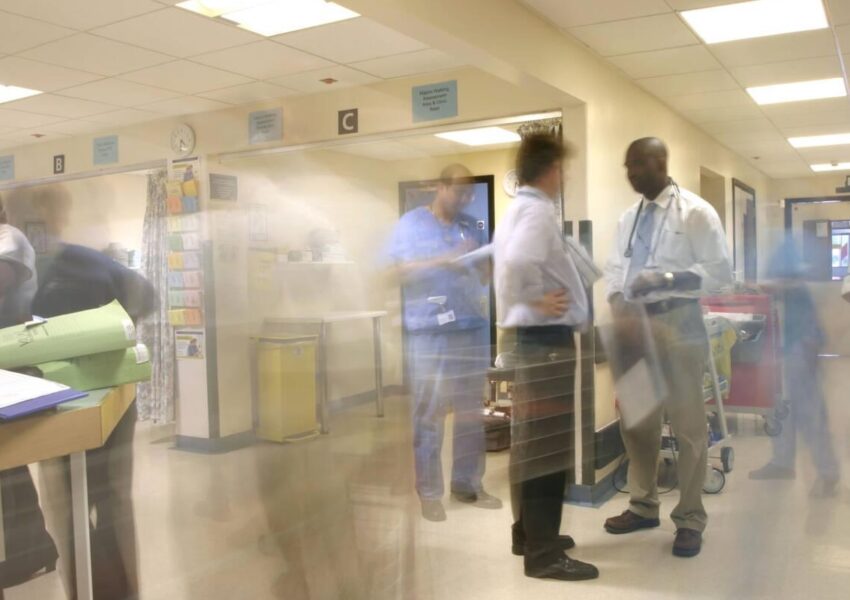
As demand outstrips resources, frontline workers navigate fragmented systems and bureaucratic thinking compromises high-stakes decision making, the question remains: how much longer can it hold?
The NHS has long been regarded as one of the greatest public healthcare systems in the world. However, in recent years, a perfect storm of underfunding, understaffing, and increasing patient demand has left it in a fragile state.
Nowhere is this more evident than in the field of mental health crisis care, where frontline workers operate under immense pressure, often making high-stakes decisions with inadequate resources. As part of his role as Medical Director and Clinical Safety Officer at Thalamos, Dr Iain Grant, also a consultant psychiatrist with experience working as both an NHS doctor and in the independent sector, offered a candid assessment of the risks inherent in the current system.
The supply and demand mismatch
A fundamental challenge in the NHS today is the imbalance between demand for healthcare services and the available supply of doctors, nurses, and mental health professionals. Grant pointed out that that NHS staffing levels have not kept pace with population growth since the 1980s — despite the burden of chronic disease increasing, and mental health conditions receiving more attention than ever before.
According to the British Medical Association (BMA), the NHS is facing a workforce crisis, with 8,000 doctor vacancies and 32,000 nurse vacancies across the UK. The impact of these shortages is felt acutely in mental health services, where patients experiencing crises often have nowhere to turn.
“We’re in a situation where frontline care workers aren’t able to ensure clinical priority always come first, despite their desire to,” Grant explained. “The system forces staff to prioritise meeting performance metrics, such as the four-hour wait time in A&E, instead of focusing on the most urgent cases. Often, more severe conditions can be pushed behind smaller injuries to meet time pressures and certain metrics.”
As part of the latest set of NHS England priorities and operational planning guidance, the number of targets and metrics have been cut to ease strain and focus improvement efforts. However, the counter to that is a removal of targets linked to specific parts of acute care such as mental health, which may in turn then mean less funding and resource is available to drive uplifts in those spaces.
A fragmented and siloed system
One of the most shocking realities for doctors new to the NHS is the lack of a unified, seamless healthcare platform. “What surprises most junior doctors is that there isn’t one integrated NHS system,” Grant said. “There’s no shared template for patient history. So, when a patient moves between services, they have to repeat their entire medical history, increasing the risk of errors and delays.”
This fragmentation also leads to a phenomenon known as “siloed working”, where different departments or specialities operate independently rather than collaboratively. “Teams will refer cases up the chain multiple times before someone finally takes responsibility,” Grant noted. “That’s because every team is so overstretched that they will refer and transfer the case to another department whenever possible. They don’t want to do this but it’s just a reality of a strained system.”
This lack of coordination is particularly dangerous in mental health crisis care, where a holistic understanding of a patient’s history is essential. If a patient has attempted suicide in the past, for example, but that information isn’t readily available to a crisis team, they may make a decision that increases risk rather than mitigates it.
High stakes
Mental health is distinct from physical health in one crucial way: in most cases of physical illness, there is no evidence to suggest that the patient’s capacity may be impaired. “If a patient in cardiology refuses treatment, that would likely be accepted and the onus is on the individual to engage with the recommended treatment and monitoring,” Grant explained. “But in mental health, that assumption does not necessarily exist and is always under consideration because a core feature of many conditions is that the patient may not realise they’re unwell. We would therefore have a duty of care to reach out and provide that care, shifting the responsibility of that individual’s health to the mental health team.”
This presents an ethical dilemma. Under the Mental Capacity Act, healthcare professionals must assess whether a patient has the capacity to make informed decisions about their treatment. But proving that someone lacks capacity has a high bar, making it difficult to intervene even when it’s clear they need help. “The government places a very high value on individual liberty,” Grant believes. “There’s such a high burden of proof required to detain provide necessary care that many patients who need urgent care can sometimes fall through the cracks.”
One of the most contentious aspects of mental health care is risk assessment. “Unsurprisingly, there’s limited evidence that we can predict the future,” Grant stated in a slightly tongue-in-cheek way. “Risk assessment is a fallacy — anyone who claims they can predict, with any degree of certainty, that a patient will harm themselves or someone else is misleading themselves. We can only look at past behaviour, the current degree of symptoms and risk factors. We cannot definitively predict future actions.”
Despite this, mental health professionals are expected to make life-and-death decisions based on risk assessments. “Doctors are put in impossible positions,” Grant commented. “If you admit too many patients, you’re criticised for using up limited resources. If you don’t admit enough, you’re blamed if something goes wrong.”
The personal risk
Risks in mental health crisis care aren’t just limited to patients — frontline workers themselves often operate under personal threat. “There’s a much higher risk of being threatened, assaulted or stalked in mental health care compared to other areas of medicine,” Grant explained. “It does happen to GPs and A&E doctors as well, but not as frequently because of the increased challenges with the dynamics around detentions and the nature of symptoms encountered.”
Yet, when these incidents occur, there is often little recourse for the staff involved. “If a nurse is assaulted, there is very little meaningful action. There’s no compensation, rarely a criminal conviction, no justice for it,” Grant said. This culture of impunity further contributes to staff burnout and personal safety features simply by turning up to work, exacerbating the already dire workforce crisis.
The impact of under-resourcing
The chronic underfunding of mental health services has a direct impact on patient outcomes. According to a 2024 survey by Rethink Mental Illness, four out of five people reported that their mental health deteriorated while waiting for treatment. The average waiting time for mental health support in England is now over 12 weeks, with some patients waiting more than a year for specialist care.
Grant pointed out that repeated hospital visits are a symptom of systemic failure. “If a patient has been to the hospital seven times and they still haven’t had their problems properly addressed, that’s a sign the system isn’t working,” he said.
One of the few success stories in mental health care has been early intervention in psychosis (EIP) teams. “These teams throw larger upfront resources at patients in the early stages of psychosis,” Grant added. “The idea is that by investing heavily in early intervention, you prevent a revolving door of repeated crises — improving prognosis and preventing more expensive inpatient care in the future.”
However, funding for EIP teams remains limited, previous “assertive outreach” teams have now largely been disbanded and broader mental health services continue to be constrained by budget cuts. “The system and its targets are focused on reducing the length of hospital stays rather than preventing readmissions,” Grant revealed. “That’s short-term thinking that doesn’t benefit patients in the long run.”
The digital bottleneck
A lack of digital pathways in mental health services introduces significant clinical and operational risks. Manual processes often result in delays when admitting patients, particularly during out-of-hours, out-of-area, and high-pressure situations. These delays can escalate patient distress and increase the likelihood of adverse incidents.
Without a digital system, frontline staff face ambiguity in procedures, misplaced statutory forms, and delays in processing — potentially leading to unlawful detentions and distress for patients. Handwritten or manually-inputted records are prone to errors, omissions, and misinterpretations, which can result in inappropriate care decisions. Without automated checks and validations, these risks are magnified, increasing the likelihood of incomplete or inaccurate documentation.
Operationally, manual documentation increases workforce strain, detracting from time spent on patient care. Overburdened staff are more likely to experience burnout, reducing morale and job satisfaction. Additionally, without a robust digital system, organisations struggle to maintain accurate patient records, increasing legal and regulatory risks. Inconsistent processes and undocumented care pathways create inefficiencies and make institutions vulnerable to reputational damage and regulatory scrutiny.
A need for reform
Grant’s insights paint a sobering picture of a healthcare that is potentially at breaking point. Staff are stretched thin, forced to work within a fragmented system that prioritises bureaucratic targets over patient needs. Mental health professionals must navigate ethical minefields with limited support, all while facing personal risk and job insecurity.
There is evidence, from the actions of the new Labour government and Secretary of State for Health Wes Streeting through NHS England and individual trusts, that concerted efforts are being made to improve the way the system operates, shift the focus to prevention and early intervention, and provide for better patient outcomes. However, without significant investment and systemic reform, the risks associated with mental health crisis care and wider healthcare itself will continue to grow. The NHS was designed to be a safety net for all. Without urgent action, it may soon become a system that fails both its patients and those who work tirelessly to care for them.
Dr Iain Grant is Clinical Director and Consultant Psychiatrist at St Andrew’s Healthcare. He has previously held clinical roles within the NHS at East London NHS Foundation Trust, Lancashire Teaching Hospitals NHS Foundation Trust and Oxford Health NHS Foundation Trust. Grant is also Medical Director and Clinical Safety Officer at Thalamos, where he provides medical leadership and guidance on the clinical application of healthcare software to frontline use.



